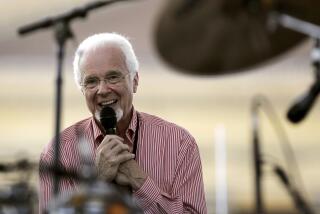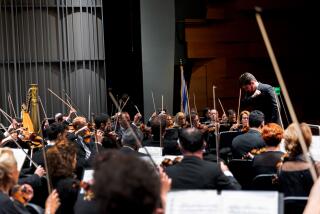The Enduring, Lucid Pierre Monteux
- Share via
Paris-born Pierre Monteux (1875-1964) was not the kind of conductor who inspired polemics. He was a supreme professional who found greater satisfaction in serving his chosen composers--an impressively variegated lot--than in exhibiting his own ego.
One didn’t speak of “Monteux’s Beethoven” or “Monteux’s Debussy” as one did of the specialties of such iconic figures as Wilhelm Furtwangler and Arturo Toscanini, both of whom were Monteux’s near-contemporaries and both of whom he outlived.
Monteux didn’t compete with his composers; rather, he brought to their scores skill and dedication in a long career with his own Paris orchestra at the outset; then as de facto principal guest conductor of the Boston Symphony; as music director not of one of America’s glamour ensembles but of the San Francisco Symphony, and, finally, as principal conductor of the London Symphony, a post he took up in 1961 at the age of 86.
The one job where Monteux made waves was as conductor for Diaghilev’s Ballets Russes between 1911 and 1914, where he was entrusted with the world premieres of Stravinsky’s “Petrushka” and “Le Sacre du Printemps,” Ravel’s “Daphnis et Chloe” and Debussy’s “Jeux”--defining moments in 20th-Century music.
In his recordings, many of the most celebrated of which are now collected by RCA in the massive, boxed “Pierre Monteux Edition” (61893, 15 CDs, mid-price)--spanning the years 1941-1961--he is shown to be the most lively, unaffected and clarifying of musicians.
Although some of the material is new to CD, much of the best of it has never been out of circulation for long, such as the “Petrushka” and “Sacre,” recorded with the Boston Symphony during the 1950s.
While the Stravinsky interpretations are too familiar to occasion surprise at this stage of the game, they do sound better than ever in the present remasterings.
This “Sacre,” recorded in 1951, remains one of recorded history’s enduring thrillers: weighty, thunderous and dark, played with breathtaking virtuosity by the BSO and somehow more “modern”-sounding than the quick, steely, translucent interpretation that the composer himself established as a worldwide standard in his later years.
The recorded sound here, as in all the post-San Francisco recordings, is superb, the monophonic “Sacre,” if anything, more immediate in its sonic impact than the stereo “Petrushka.”
Elsewhere, there’s a bright and brash Berlioz collection, including the “Symphonie Fantastique” and “Benvenuto Cellini” Overture, exemplifying Monteux’s happiest days in San Francisco.
There’s a gutsy Debussy “Images” with the same orchestra, although it’s hardly in a class with the same composer’s “Nocturnes,” with the BSO’s iridescent strings and gleaming solo winds.
Beethoven’s Fourth and Eighth symphonies, likewise from San Francisco, are smartly paced and classically clear-eyed, but both were later to be re-recorded by Monteux with better orchestras and undiminished vitality.
Among the most questionable inclusions, all from San Francisco, is a Mahler “Kindertotenlieder” where the conductor’s firm, idiomatic grasp and Marian Anderson’s poignant solo cannot compensate for labored orchestral inadequacies. Why this was chosen over the same performers’ altogether superb Brahms “Alto Rhapsody” is a head-scratcher.
Then too mezzo Glady Swarthout’s pathetically short-breathed encounter with Chausson’s ecstatic “Poeme d’amour et de la mer,” is an embarrassment amid the riches of Monteux’s firm, unsentimental way with the music of Cesar Franck--here including a powerful D-minor Symphony with the Chicago Symphony--and his disciples.
And there’s a scruffy, sonically crude Strauss “Heldenleben,” counterbalanced by the same composer’s “Tod und Verklarung,” led with tremendous, dramatic sweep and showing the San Francisco Symphony in something approaching world-class form.
Also among the collection’s glories are the last three Tchaikovsky symphonies, with the Boston Symphony: a model marriage of lucidity and passion.
More to Read
The biggest entertainment stories
Get our big stories about Hollywood, film, television, music, arts, culture and more right in your inbox as soon as they publish.
You may occasionally receive promotional content from the Los Angeles Times.










